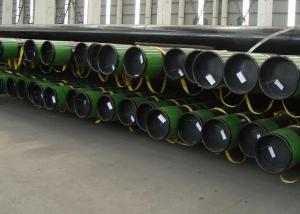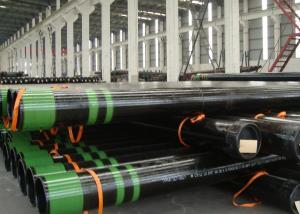BS 1387 Oil Tubing and Tubing Pipe
- Loading Port:
- Baoshan Port
- Payment Terms:
- TT or LC
- Min Order Qty:
- 50T m.t.
- Supply Capability:
- 5000 Tons Per Month m.t./month
OKorder Service Pledge
OKorder Financial Service
You Might Also Like
API Specification 5CT / ISO 11960:2001
Packaging & Delivery of oil tubing
Packaging Detail: Wrapped in bundle with steel strip
Delivery Detail: 30~50 days
Specifications of oil tubing
1. Manufaturer of billet and seamless steel pipe
2.Superior quality with moderate price
3. Wide size range
4.Quick delivery
Item: | Seamless Steel Pipe |
1. Outer Diameter: | 73mm-720mm (2.1/2inch -28inch) |
2. Wall Thickness: | 4mm-30mm |
3. Length: | 6m-12m |
4. Producing Standard: | American ASME B36.10M, ASTM, API 5L, API 5CT |
Japanese JIS | German DIN |
Chinese GB | BS standard |
5. Main Material: | (Carbon Steel & Low Alloy steel) |
ASTM A53, A106, A210, A252, A333, etc; | X42, X46, X52, X60, X65, X70, etc; |
The productive process of Oil Tubing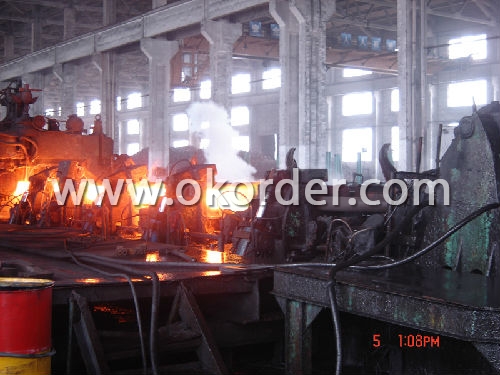
Air cooling
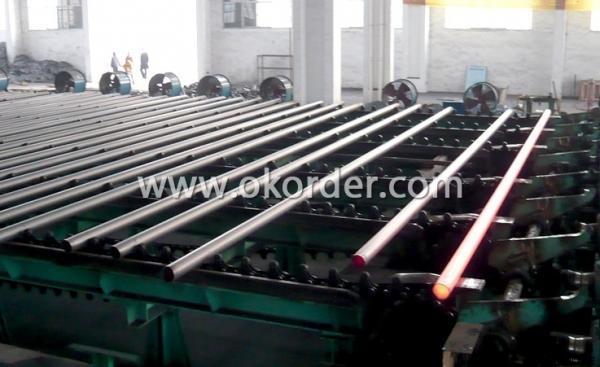
The package of steel oil tube
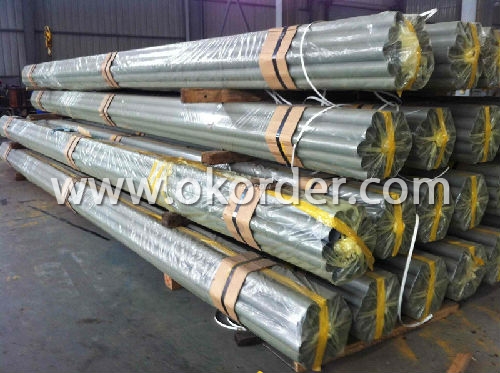
Oil tube Stock
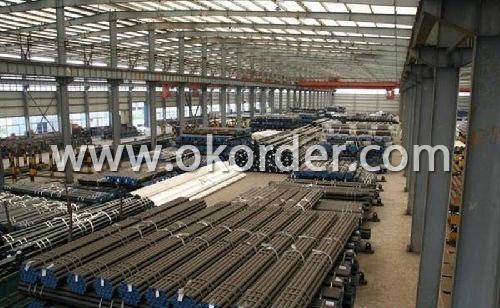
- Q:What are the different methods of insulating steel pipes?
- There are several different methods of insulating steel pipes, depending on the specific needs and requirements of the application. Some of the common methods include: 1. Insulation wraps: This method involves wrapping the steel pipes with insulating materials such as fiberglass, mineral wool, or foam insulation. The insulation is then secured with adhesive or tape to ensure a tight and secure fit. Insulation wraps are cost-effective and relatively easy to install, making them a popular choice for many applications. 2. Insulation coatings: This method involves applying a layer of insulating material directly onto the surface of the steel pipe. The coating can be made from materials such as epoxy, polyurethane, or polyethylene. Insulation coatings are ideal for situations where the pipes are exposed to harsh environments, as they provide a protective barrier against corrosion and temperature fluctuations. 3. Insulation jackets: This method involves using pre-fabricated insulation jackets that are designed to fit over the steel pipes. These jackets are typically made from a combination of insulation materials and a weatherproof outer layer. Insulation jackets are commonly used for outdoor or exposed pipelines, as they provide excellent insulation and protection against external elements. 4. Insulation foam: This method involves injecting foam insulation into the cavity between the steel pipe and an outer casing. The foam expands and hardens, creating a sealed and insulated layer around the pipe. Foam insulation is highly effective in preventing heat loss or gain, and it also provides excellent soundproofing properties. 5. Insulation tapes: This method involves using specialized insulation tapes that are wrapped around the steel pipes. These tapes are typically made from materials such as PVC or rubber, which have good insulating properties. Insulation tapes are often used for smaller pipes or joints, as they provide a flexible and easy-to-apply solution. It is important to consider factors such as the operating temperature, environmental conditions, and specific requirements of the application when choosing the appropriate method of insulating steel pipes. Consulting with a professional or insulation specialist can help in determining the most suitable insulation method for your specific needs.
- Q:Can steel pipes be used for conveying abrasive materials?
- Yes, steel pipes can be used for conveying abrasive materials. Steel pipes are known for their durability and resistance to wear, making them suitable for handling abrasive materials. Additionally, steel pipes can be lined with various protective coatings or linings to further enhance their resistance to abrasion and extend their lifespan.
- Q:What is the difference between ERW (Electric Resistance Welded) and LSAW (Longitudinal Submerged Arc Welded) steel pipes?
- ERW steel pipes are manufactured using the process of high-frequency electrical current passing through the metal, creating heat that fuses the edges of the steel together. On the other hand, LSAW steel pipes are produced by submerging the steel plate in a welding zone, where an arc is struck and the edges of the plate are melted and fused together. In terms of the welding technique, ERW pipes use electrical resistance while LSAW pipes use submerged arc welding. Additionally, LSAW pipes are typically used for larger diameter and thicker wall thickness applications, while ERW pipes are commonly used for smaller diameter and thinner walls.
- Q:How many fasteners are there in a ton of steel tubes?
- In general, 180-200 fasteners per ton of steel pipe.
- Q:Are steel pipes suitable for structural applications?
- Yes, steel pipes are suitable for structural applications due to their high strength, durability, and versatility. They are commonly used in various construction projects such as buildings, bridges, and infrastructure due to their ability to bear heavy loads, resist corrosion, and withstand extreme weather conditions.
- Q:Can steel pipes be used for structural supports?
- Yes, steel pipes can be used as structural supports due to their high strength, durability, and ability to withstand heavy loads. They are commonly used in construction for applications such as columns, beams, and braces, providing stability and support to various structures.
- Q:Can steel pipes be used for pharmaceutical manufacturing plants?
- Yes, steel pipes can be used for pharmaceutical manufacturing plants. Steel pipes are known for their durability, strength, and resistance to corrosion, making them suitable for transporting various fluids and chemicals used in pharmaceutical production. Additionally, steel pipes can be easily sanitized and meet industry standards for cleanliness, making them a reliable choice for pharmaceutical manufacturing facilities.
- Q:How do steel pipes handle pressure surges?
- Steel pipes are known for their strength and durability, which allows them to handle pressure surges effectively. When pressure surges occur in a pipeline system, steel pipes have the ability to withstand and absorb the increased force without breaking or rupturing. The high tensile strength of steel provides resistance against the pressure exerted on the pipes, preventing them from deforming or collapsing under the sudden surge. Additionally, steel pipes have a high burst pressure rating, meaning they can withstand significant increases in pressure without failing. Furthermore, steel pipes are often designed with a thicker wall thickness, which adds to their ability to handle pressure surges. The thickness of the pipe walls helps to distribute the increased force evenly, minimizing the risk of localized stress and potential failure points. Moreover, steel pipes are commonly used in conjunction with fittings and valves that are specifically designed to handle pressure surges. These fittings and valves are made from similar materials, ensuring compatibility and maintaining the integrity of the pipeline system. Overall, steel pipes are well-suited for handling pressure surges due to their strength, durability, and ability to withstand high pressures. Their resistance to deformation, high burst pressure rating, and compatibility with specialized fittings and valves make them a reliable choice for applications where pressure surges may occur.
- Q:Can steel pipes be bent?
- Yes, steel pipes can be bent. The process of bending steel pipes typically involves using specialized tools and techniques such as pipe bending machines or hydraulic presses. These tools apply force to the pipe, causing it to deform and take on the desired shape or angle. The ability to bend steel pipes makes them versatile and suitable for various applications, including plumbing, construction, and manufacturing. However, it's important to note that the degree to which a steel pipe can be bent depends on factors such as the pipe's diameter, wall thickness, and the type of steel used.
- Q:What are the safety considerations while handling steel pipes?
- When handling steel pipes, some key safety considerations include wearing appropriate personal protective equipment (PPE) such as gloves, safety glasses, and steel-toe boots to protect against potential injuries. It is important to be cautious of the weight and size of the pipes, using proper lifting techniques and equipment to prevent strains or accidents. Additionally, workers should be mindful of the sharp edges and potential for cuts or punctures, ensuring they have a clear and organized workspace to minimize the risk of tripping or falling. Regular inspections of the pipes for any damages or defects are also crucial to prevent accidents and maintain a safe working environment.
1. Manufacturer Overview |
|
|---|---|
| Location | Shanghai China |
| Year Established | 1999 |
| Annual Output Value | Above Thirty Million RMB |
| Main Markets | Main land;Middle East; Southeast Asia |
| Company Certifications | ISO 9001:2010;API 5L |
2. Manufacturer Certificates |
|
|---|---|
| a) Certification Name | |
| Range | |
| Reference | |
| Validity Period | |
3. Manufacturer Capability |
|
|---|---|
| a)Trade Capacity | |
| Nearest Port | Baoshan |
| Export Percentage | 41% - 50% |
| No.of Employees in Trade Department | 300-500 People |
| Language Spoken: | English; Chinese |
| b)Factory Information | |
| Factory Size: | 30,000 square meters |
| No. of Production Lines | Above 10 |
| Contract Manufacturing | OEM Service Offered; Design Service Offered |
| Product Price Range | Average |
Send your message to us
BS 1387 Oil Tubing and Tubing Pipe
- Loading Port:
- Baoshan Port
- Payment Terms:
- TT or LC
- Min Order Qty:
- 50T m.t.
- Supply Capability:
- 5000 Tons Per Month m.t./month
OKorder Service Pledge
OKorder Financial Service
Similar products
New products
Hot products
Related keywords
